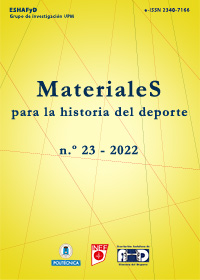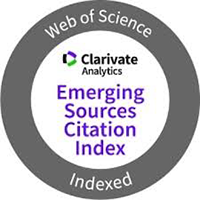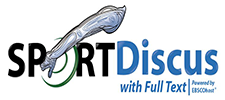At the beginnings of Central American Olympism: Pedro J. Matheu
DOI:
https://doi.org/10.20868/mhd.2022.23.4601Keywords:
Pedro J. Matheu, Central America, Central American Games, Olimpism.Abstract
During the inter-war period, Olympism achieved growing prestige, both for its work and for the expansion of sport at all levels and its positive regard. The IOC sought to extend its influence beyond European borders and one of the areas of expansion was Latin America. To this end, the collaboration of members of the IOC was sought and among them the figure of Pedro J. Matheu, a Salvadorian diplomat who served to spread the principles promoted by Baron de Coubertin in Central America, stood out. His personal archives show the efforts made to set up the Central American and Caribbean Games and their celebration in 1926, 1930, 1935 and 1938, and the strategies followed from Lausannefor their development.
Downloads
References
Bayers, Peter L. 2003. Imperial ascent. Mountaineering, masculinity and empire. Boulder: University Press of Colorado.
Beracasa, José. 1976. “From 1926 to 1976. Twelve Central American and Caribbean Games”. Olympic Review, n.º 109-110: 626-9 y 659.
Bermond, Daniel. 2008. Pierre de Coubertin. París: Perrin.
Carpentier, Florence. 2004. Le Comité international olympique en crises: la présidence de Henri de Baillet-Latour, 1925-1940. Espaces et temps du sport. París: L’Harmattan.
Carpentier, Florence. 2018. “Henri de Baillet-Latour: Globalising the Olympic Movement”. En Global sport leaders: A biographical analysis of international sport management, editado por Emmanuele Bayle y Patrick
Clastres, 107-23. Cham: Palgrave-Macmillan.
Chabot, C. 1900. “Le Congrès international d’éducation physique (30 août - 6 septembre 1900)”. Revue pédagogique 37, n.º 2: 605-21.
Chatziefstathiou, Dikaia e Ian P. Henry. 2012. Discourses of Olympism. From the Sorbonne 1894 to London 2012. Londres: Palgrave Macmillan.
Clastres, Patrick. 2013. “Culture de paix et culture de guerre. Pierre de Coubertin et le Comité international olympique de 1910 à 1920”. Guerres mondiales et conflits contemporains 3, n.º 251: 95-114.
Clastres, Patrick. 2018. “Pierre de Coubertin: The inventor of the Olympic tradition”. En Global sport leaders: a biographical analysis of international sport management, editado por Emmanuele Bayle y Patrick Clastres, 33-60. Cham: Palgrave-Macmillan.
Colley, Ann C. 2010. Victorians in the mountains: Sinking the sublime. Franham: Ashgate.
Cordoví Núñez, Yoel. 2014. “Informando desde México: narrativas de la nación cubana en los Primeros Juegos Centroamericanos”. Secuencia, n.º 90: 149-63.
Coubertin, Pierre de. 1917. ¿Qué es el olimpismo?. París: I. Rirachowski.
Coubertin, Pierre de. 1921. “The Seventh Olympic Games”. En Report of the American Olympic Committee. Seventh Olympic Games, Antwerp, Belgium, 1920, editado por Condé Nast Press. Greenwich Conn, 47-58.
Greenwich: The Condé Nast Press.
Coubertin, Pierre de. 1965. Memorias olímpicas. Lausanne: Bureau Internacional de Pedagogía Deportiva.
Debarbieux, Bernard y Gilles Rudaz. 2010. Les faiseurs de montagne. Imaginaires politiques et territorialités, XVIIIe-XXIe siècles. París: CNRS.
Elias, Norbert. 1997. Üben den Prozess der Zivilisation: soziogenetische und psychogenetische Untersuchungen. Frankfurt am Main: Suhrkamp.
Elias, Norbert y Eric Dunning. 2003. Sport und Spannung im Prozess der Zivilisation. Frankfurt am Main: Suhrkamp.
Ellis, Reuben. 2001. Vertical margins: Mountaineering and the landscapes of Neoimperialism. Madison: University of Wisconsin Press.
Gafner, Raymond. 1994. 1894-1994. The international Olympic Committee. One hundred years. The Idea, The Presidents, The Achievements, I. Lausanne: International Olympic Committee.
Guttmann, Allen. 1994. Games and Empires: Modern Sports and Cultural Imperialism. Nueva York: Columbia University Press.
Guttmann, Allen. 2001. “Sport”. En Encyclopedia of European Social History. From 1350 to 2000, editado por Peter N. Stearns, V, 167-84. Detroit: Charles Scribner`s Sons.
Hobsbawm, Eric. 1993. “The Example of the English Middle Class”. En Bourgeois Society in Nineteenth-century Europe, editado por Jürgen Kocka y Allen Mitchell, 127-50. Oxford: Berg.
Hubscher, Ronald, Bernard Jeu y Jean Durry. 1992. Le sport dans la société française (XIXe–XXe siècle). París: Armand Colin.
Jarvie, Grant. 1991. Sport, racism and ethnicity. Londres: Routledge.
Krüger, Michael. 1996. Körperkultur und Nationsbildung: die Geschichte des Turnens in der Reichgründungsära. Eine Detailstudie über die Deutschen. Schorndorf: Hofmann.
Llewellyn, Matthew P. y John Gleaves. 2016. The rise and fall of Olympic Amateurism. Urbana: University of Illinois Press.
Mason, Tony y Eliza Riedi. 2010. Sport and the military. The British Armed Forces 1880-1960. Cambridge: Cambridge University Press.
Matheu, Pedro J. 1917. [Prólogo] a Pierre de Coubertin. ¿Qué es el olimpismo?, 6-7. París: I. Rirachowski.
McGehee, Richard V. 1992. “The rise of modern sport in Guatemala and the first Central American Games”. The International Journal of the History of Sport 9, n.º 1: 132-40.
McGehee, Richard V. 1993. “The origins of Olympism in Mexico: The Central American Games of 1926”. The International Journal of the History of Sport 10, n.º 3: 313-32.
Mejía, Julio E. 1936. Memoria de los terceros Juegos deportivos Centro Americanos: San Salvador, 16 de marzo al 5 de abril
de 1935. San Salvador: Junta Nacional de los Juegos deportivos Centro Americanos.
Memoria de los Primeros Juegos Deportivos Centro-Americanos, celebrados en la Ciudad de México, Estados Unidos Mexicanos,
de octubre al 2 de noviembre 1926. 1926. La Habana: Junta Nacional de los Juegos Deportivos Centro-Americanos.
Montesinos, Enrique. 2017. Los Juegos regionales más antiguos: Juegos Deportivos Centroamericanos y del Caribe. The
oldest regional Games: Central American and Caribbean Sports Games. La Habana: ODECABE.
Müller, Norbert y Ralf Tuttas. 2000. “The role of the YMCA: Especially that of Elwood S. Brown, Secretary of Physical Education of the YMCA, in the world-wide expansion of the Olympic Movement during Pierre de Coubertin’s presidency”. En Bridging three centuries: intellectual crossroads and the modern Olympic movement. Fifth International Symposium for Olympic research, editado por Kevin B. Wamsley, 127-34. Londres: University of Western Ontario.
Nauright, John y David K. Wiggins. 2016. Routledge handbook of sport, race and ethnicity. Londres: Routledge.
Palomo, Fernando. 2019. “Don Pedro Jaime de Matheu: el primer olímpico salvadoreño”. ElGráfico.com, 29 de julio de 2019. https://www.elgrafico.com/gamadeportiva/Don-Pedro-Jaime-de-Matheu-el-primerolimpico-salvadoreno-20190729-0017.html
Polycarpe, Cyril. 2013. “Regional Games as an extension of the Olympic idea: the exemple of Central American Games (1926)”. Stadion 39, n.º 1: 57-74.
Quanz, Dietrich R. 1993. “Civic pacifism and sports-based internationalism framework for the founding of the international Olympic Committee”. Olympika. The International Journal of Olympic Studies 2: 1-23.
Report of the American Olympic Committee. Seventh Olympic Games, Antwerp, Belgium 1920. 1921. Greenwich: The Condé Nast Press.
Thompson, Edward Palmer. 2012. La formación de la clase obrera en Inglaterra. Madrid: Capitán Swing.
Torre Saavedra, Ana Laura de la. 2017. La cultura física en la ciudad de México; recreación, internacionalismos, nacionalismos, 1896-1939. México: El Colegio de México. Centro de Estudios Históricos.
Torres, César R. 2006. “The Latin American ‘Olympic explosion’ of the 1920s: Causes and consequences”. The International Journal of the History of Sport 23, n.º 7: 1088-111.
Torres, César R. 2008. “‘Spreading the Olympic Idea’ to Latin America: The IOC-YMCA partnership and the 1922 Latin American Games”. Journal of Olympic History 16, n.º 1: 16-24.
Torres, César R. 2020. “Completing the account: The complex preparations for the 1926 Central American Games”. Journal of Olympic Studies 1, n.º 1: 37-59.
Wagg, Stephen. 2012. “Tilting at windmills? Olympic politics and the spectre of amateurism”. En The Palgrave Handbook of Olympic Studies, editado por Helen Jefferson Lenskyj y Stephen Wagg, 321-36.
Houndmills: Palgrave Macmillan.
XIª Olimpíada Berlín 1936. Manual de las disposiciones generales y del reglamento de deportes, Organisationskomitee für die XI. Olympiade Berlin 1936 (Comité Organizador). 1936. Berlín: Reichssportverlag.
Young, David C. 2004. A brief history of the Olympic Games. Londres: Wiley-Blackwell.
Downloads
Published
Issue
Section
License
Authors who submit to this journal agree to the following terms:
- Author(s) keep copyright and guarantee to the journal the right to be the first publication of the work as licensed under Creative Commons Attribution-Noncommercial-ShareAlike 4.0 International as initial publication in this journal.
- Author(s) can establish additional agreements for non-exclusive distribution of the version of the work published in the journal (for example, to an institutional archives or to publish it in a book), with an acknowledgment of its initial publication in this journal.
- It is allowed and authors are encouraged to disseminate their work electronically (e.g, in institutional open archives or on their own website) before and during the submission process, as it can lead to productive exchanges, as well as a citation earlier and more of published work (See the Effect of Open Access).












